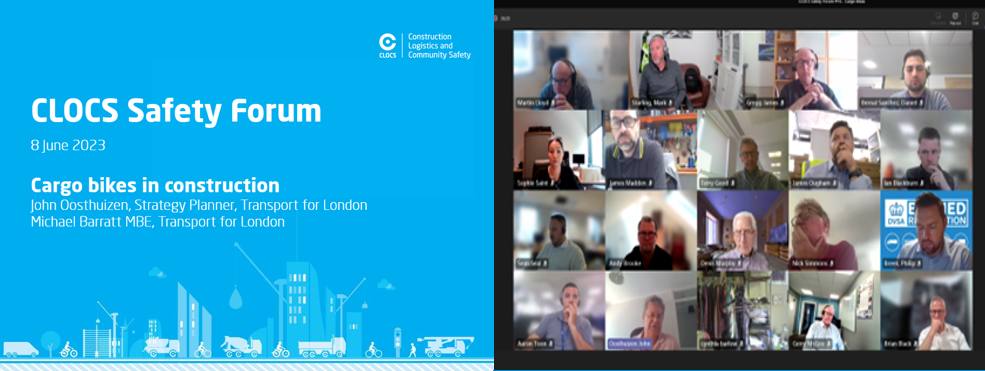
Cargo bikes in construction
The CLOCS community is committed to driving safer, leaner and greener construction logistics and to adopting and implementing Construction Logistics Plans for all relevant construction activity.
A fundamental requirement within any CLP is the consideration of Planned Measures used to influence behaviours that reduce environmental impact, road risk and congestion, and part of that is exploring other means of moving goods and materials by alternative methods of transport. Historically, this section of the CLP has focussed on the use of rail and/or water but it is now clear that cargo bikes have a role to play.
Cargo bikes are not currently referenced within the CLOCS Standard and are only mentioned briefly within our CLP training but with these becoming ever-more prevalent on our streets, now is the time to start a discussion about how these might be adopted within construction logistics as a safe, efficient and sustainable method of moving materials over short distances, and what role CLOCS has to play.
With this in mind, we invited John Oosthuizen, Strategy Planner, and Michael Barratt MBE, Construction Advisory & Innovations Manager, both from Transport for London, to share their knowledge, experience and insights with the CLOCS community.
John started by outlining the context for the development of the TfL Cargo Bike Action Plan and covered the areas to be addressed – growth and infrastructure, safety and behaviour change. He outlined the action plan commitments providing a detailed breakdown of the work to be done over the next 12 to 18 months.
John’s slides are available here.
We also provide links below to the following resources developed by TfL:
- Cycle Freight Toolkit Introduction
- Delivery and Servicing Plan Guidance
- Cycle Freight Code of Conduct
- TfL Cargo Bike Action Plan
Michael talked through his own experiences of working with the industry to trial cargo bikes in a live environment, assessing load capabilities, identifying risk, potential outcomes and control measures, collaborating with industry partners and promotion.
He shared some of the specific findings from these trials including cost savings, time savings, reduced emissions and the positive impact on those involved.
Michael also shared some of the challenges experienced to date and highlighted those areas where more work needs to be done – training, minimising negative behaviours, crime and security, and routing challenges.
Michael also mentioned the Cargo Bike Working Group that TfL operate and invited all delegates to get involved. The Terms of Reference document has been distributed with these notes and if interested, please email Michael directly at michael.barratt@tfl.gov.uk.
Michael closed by sharing details of a specific case study involving an HSS depot and the journey the branch and the people involved had been on. Our thanks to CLOCS Champion HSS for allowing Michael to share this fascinating example with the Forum.
Michael’s presentation is shared here.
There were a number of queries from members around standards, insurance, monitoring and what steps clients and principal contractors need to undertake to ensure they can accommodate cargo bike deliveries in a safe way that doesn’t present a risk to the project or the general public.
Looking forward
It seems clear that cargo bikes are here to stay so the construction industry needs to be proactive in collaborating to develop appropriate standards, not just for those who operate cargo bikes but all stakeholders involved in construction, particularly principal contractors who need to plan and manage such deliveries on and off projects.
CLOCS will continue to liaise with TfL to follow the progress of the action plan and will provide updates to members via the Bulletin and member meetings.
Work will commence shortly to start looking at what needs to be updated for the next version of the CLOCS Standard in 2024 so we will ensure cargo bikes are part of that discussion. We will also develop a new page on the CLOCS website dedicated to cargo bikes where some of the new and emerging resources and case studies can be held.
And finally…
Our thanks to John and Michael for giving up their time to share their knowledge and insights with the CLOCS community, and thanks also those who attended, sharing their own thoughts and experiences. The voice of Champions is vital to the success of CLOCS so please contact the team if you have any queries, suggestions or concerns about any aspect of CLOCS.
CLOCS needs you…
These Safety Forums are designed to support and inform CLOCS members so please do get in touch if you have any suggestions for future topics or whether you, or someone you know, would want to come along to a future Forum and share their expertise on a particular topic.
If you can think or anything or anyone, please contact the CLOCS team at support@secbe.org.uk


